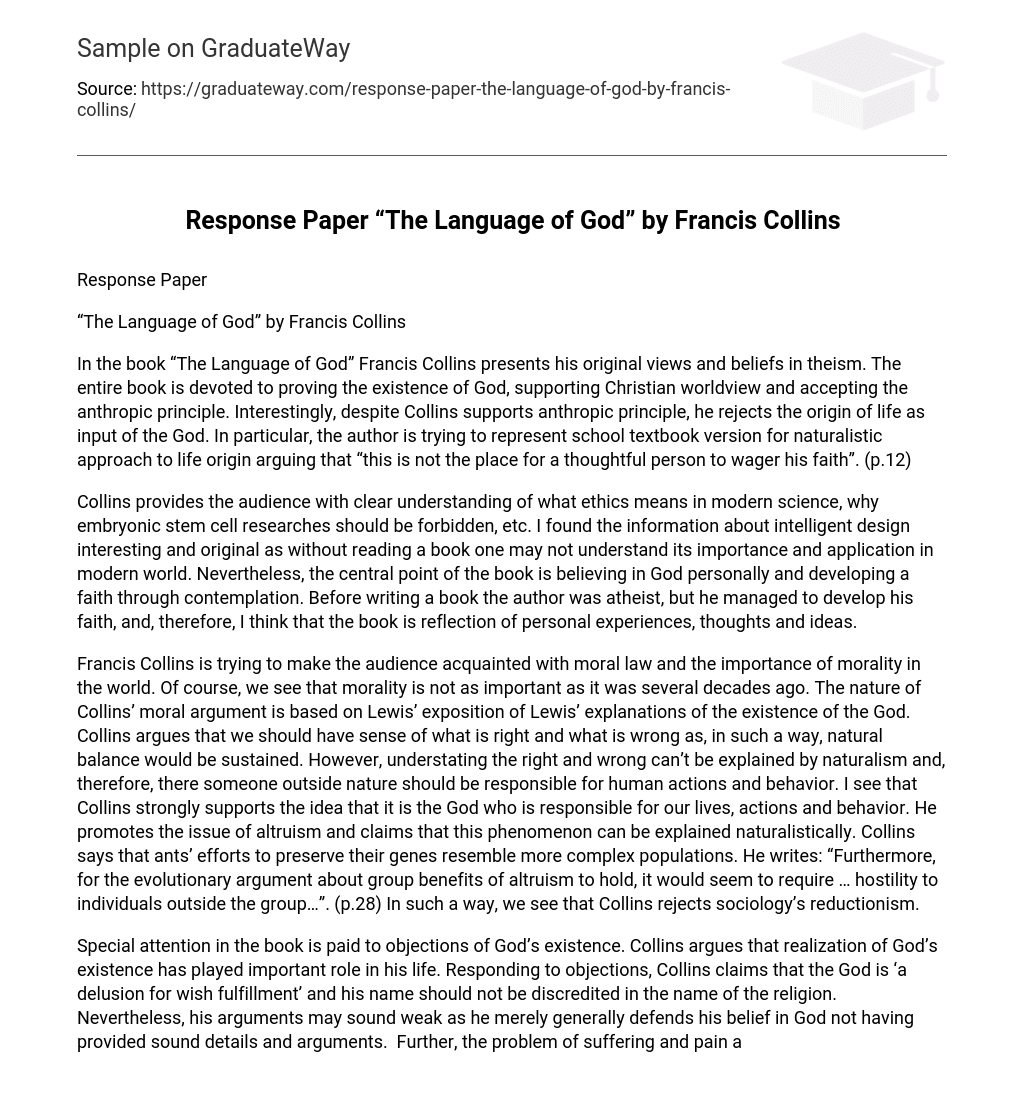In the book “The Language of God” Francis Collins presents his original views and beliefs in theism. The entire book is devoted to proving the existence of God, supporting Christian worldview and accepting the anthropic principle. Interestingly, despite Collins supports anthropic principle, he rejects the origin of life as input of the God. In particular, the author is trying to represent school textbook version for naturalistic approach to life origin arguing that “this is not the place for a thoughtful person to wager his faith”.
Collins provides the audience with clear understanding of what ethics means in modern science, why embryonic stem cell researches should be forbidden, etc. I found the information about intelligent design interesting and original as without reading a book one may not understand its importance and application in modern world. Nevertheless, the central point of the book is believing in God personally and developing a faith through contemplation. Before writing a book the author was atheist, but he managed to develop his faith, and, therefore, I think that the book is reflection of personal experiences, thoughts and ideas.
Francis Collins is trying to make the audience acquainted with moral law and the importance of morality in the world. Of course, we see that morality is not as important as it was several decades ago. The nature of Collins’ moral argument is based on Lewis’ exposition of Lewis’ explanations of the existence of the God. Collins argues that we should have sense of what is right and what is wrong as, in such a way, natural balance would be sustained. However, understating the right and wrong can’t be explained by naturalism and, therefore, there someone outside nature should be responsible for human actions and behavior. I see that Collins strongly supports the idea that it is the God who is responsible for our lives, actions and behavior. He promotes the issue of altruism and claims that this phenomenon can be explained naturalistically. Collins says that ants’ efforts to preserve their genes resemble more complex populations. He writes: “Furthermore, for the evolutionary argument about group benefits of altruism to hold, it would seem to require … hostility to individuals outside the group…”. In such a way, we see that Collins rejects sociology’s reductionism.
Special attention in the book is paid to objections of God’s existence. Collins argues that realization of God’s existence has played important role in his life. Responding to objections, Collins claims that the God is ‘a delusion for wish fulfillment’ and his name should not be discredited in the name of the religion. Nevertheless, his arguments may sound weak as he merely generally defends his belief in God not having provided sound details and arguments. Further, the problem of suffering and pain are tackled as well. I agree with Collins’ position that sufferings are necessary for building stronger moral character, but the question remains: whether we are created with the need of suffering for achieving moral perfection? Collins says that proper interpretation of the Fall give us the answer – suffering and pain are not created by the God; instead, they are consequences of the Fall.
Collins provides interesting arguments about miracles and whether they are rational. He assumes that “a discussion about the miraculous quickly devolves to an argument about whether or not one is willing to consider any possibility whatsoever of the supernatural”. In contrast to theism, atheism rejects the possibility of miracles, but theism strongly supports them as religious display. Collins cautions that “it is crucial that a healthy skepticism be applied when interpreting potentially miraculous events, lest the integrity and rationality of the religion perspective be brought into question”. The only disturbing moment is that the author has mixed operational science with origins science.
According to Collins, our Universe has originated out of nothingness more than 14 billion years ago. The mechanism of life origin remains unknown, but the process of natural selection and evolution process has managed to develop biological diversity and complexity. However, it is not understandable why the supernatural intervention is not mentioned in the Earth creation. If the author supports God’s existence, why doesn’t he say anything about the God as Earth creator? Collins explains simply that evolution process doesn’t require any supernatural intervention. He admits that “there is nothing inherently in conflict between the idea of a creator God and what science had revealed”.Humans are viewed as the part of evolution process. We see that Collins supports some of the Darwinian views, although they are strongly criticized today. Thus, human culture characterizes human search for God and the moral law.
The book “The Language of God” by Francis Collins offers original and interesting views on atheism, the God as creator, evolution process and natural selection. The strong point is that the author uses personal examples and experiences when proving God’s existence. I think that all Christians may find the book exciting and fascinating. The purpose of the book is to spread the idea that faith is reasonable and the God is responsible for our lives, actions and behavior. Moreover, he supports the notions that sciences and faith are compatible and they may co-exist. Nevertheless, the weak moment is that Collins doesn’t try to create harmony between science and faith. According to Collins, presence of moral law stresses the holiness and righteousness of the God. Collins should re-think his ideas on Christianity as the only religion and solution to the problem of the sin.
References
Collins, Francis. (2006). The Language of God: A Scientist Presents Evidence for Belief. USA: Free Press.





